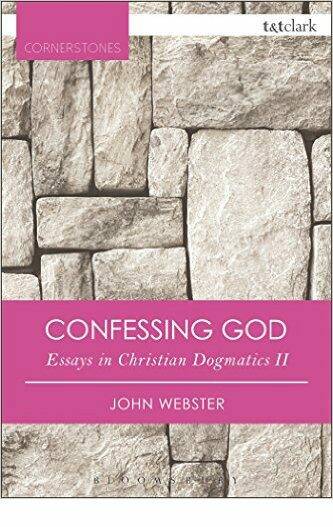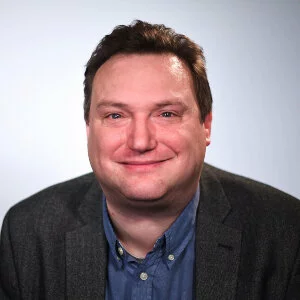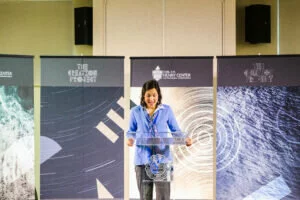John Webster’s Oxford inaugural begins with praise for his predecessor in the chair, Rowan Williams. If the fact of praise is routine in such a lecture, the content may have raised eyebrows.
Williams’s intellectual work is praised above all for being ‘prayerful’ (italics original), which is not a standard part of the Oxford lexicon of academic approbation. Further, in those opening remarks, Williams is cast as a disturber of the peace, and the university constructed as a “place of constrained conflict,” themes that will become important later in the lecture. This lecture was later published in Confessing God, and it is the “disturbance” of Webster’s lecture that I would like to ponder a little further.Theological Theology: An Inaugural Lecture delivered before the University of Oxford on 27 October 1997 by John Webster, Lady Margaret Professor of Divinity (Oxford: Clarendon Press, 1998); republished in John Webster, Confessing God: Essays in Christian Dogmatics II (London: T&T Clark, 2016, pp. 11-31). All citations follow Confessing God.
Webster’s Scholarly Jeremiad
Disturbance, however, is not enough, at least not within the discipline: “if nowadays one were to … try to reconfigure the discipline of Christian theology, the problem would be simply this: hardly anybody would notice” (12). Theology is irrelevant in the contemporary university, and has been for two centuries. The (Western) academy assumes and instantiates a set of convictions about what good intellectual work looks like, and an older mode of theological inquiry, that took “the subject matters and the cultural and intellectual processes of the Christian religion” seriously, is rendered irrelevant by these convictions. The response of much academic theology has been to internalize the same convictions and so to alienate itself from its proper subject matter.
These convictions have arisen because they have been powerful in culturally-dominant disciplines—notably the natural sciences. The privileged procedure is abstraction from particulars and the turn inwards to my constructed representations of the world. Laying aside all previous convictions as to what might be right or wrong, we construct a model of the world and reason about it. This procedure has proved extraordinarily generative in the sciences, but very difficult for most of the traditional humanities (history is the only exception offered). Buckley and Jüngel are mined for accounts of how early modern theologians colluded in their own marginalization.
Further evidence is available in the “disorder” of (what passes for) contemporary dogmatics. The prominence of the doctrine of revelation as a basis for all other doctrines is simply a mistake—“the replacement of a doctrine of God by an epistemology” (19); the (doomed) appeal to the allegedly-demonstrable historicity of the resurrection as an apologetic move is a similar failure, trying to make something that is properly consequent on divine existence and action the basis for the same.
It is striking that, concerning the doctrine of revelation, John deploys a “Calvin against the Calvinists” line to suggest that the failure became endemic in “post-Reformation dogmatics.” The same move comes up again in the next line of argument, focusing on the changing nature of theological texts. Calvin’s Institutes are held to be “loose, occasional, very close to the biblical ground” (21), as compared to the more tightly ordered, more recognizably modern, dogmatics of the later schools. Calvin is similarly praised for his commentary which, in contrast to modern Biblical commentary, is theologically generative. Some of this is down to a shift in focus: modern commentary is interested in the pre-history of the text, not its ability to generate theological discourse. Nussbaum is invoked to lament the intellectual loss caused by “the standardization of discourse which has afflicted the humanities” (21).
One result of this, on John’s telling, is the deconstruction of the traditional theological curriculum. Biblical studies, ethics, or church history—and even doctrinal theology—become untheological in practice, assimilating instead to social anthropology,The lecture, if scholarly in tone and well-referenced, is a jeremiad. Is there hope? classics, philosophy, or another foreign discipline. Thus far, the lecture, if scholarly in tone and well-referenced, is a jeremiad. Is there hope?
John reaches for postmodernism—“Foucault, Bourdieu, Guillory, and others” (23)—to deconstruct the claim of universal rationality, but then immediately claims that Christian theology, properly practiced, ought to have done the same thing (and by its very existence within the university is at least a mute sign that this thing needs doing). It ought to do this not by being the university’s conscience, or by being a witness to a vague but worthwhile spirituality, or even by insisting on talking about God (which philosophy can do equally well), but by uncompromisingly pursuing its own proper modes of rationality and so witnessing to a different vision of what truth is and how it is to be discovered.
John’s offers Wollebius’s Compendium as an example of this practice. God is the object of theology, and so the practices of inquiry are to be those that are proper to that object, not those that we like to pretend dignify us as knowing subjects. But God is not first an object, but a subject, and so theology properly and aggressively replaces epistemologies with an account of revelation. The lecture ends reconceptualizing the modern university as a place in which such modes of inquiry can find a home.
The Nature and Place of Theology: Continuing the Journey
What are we to make of all this? The lecture is visibly a step on a journey: in his early years in Cambridge and Durham, John had struggled against doctrinal criticism as the dominant mode of doing theology. (‘Doctrinal criticism’ was a way of approaching doctrines as if the assumptions of modernity were unassailable, and the task of the theologian was to explore what might be rescued under them.) In Toronto, John met and collaborated with George Schner, who introduced him to post-liberalism and the Yale School. Here he began to find a different way of doing theology, one that was more constructive, more confident, more at home in the tradition. His Oxford inaugural was very clearly an attempt to articulate how he intended to set about the work of teaching and practicing theology.
The reader attuned to John’s mature voice, however, will find several surprises. Some are historical: he soon left behind both the “Calvin against the Calvinists” line and the denigration of scholasticism. Others are methodological: the apologetic reach to postmodern philosophers to establish the critique that theology should have been able to offer would give way to an uncompromising assertion of the sufficiency of theology, Younger theologians will not remember how pinched and impoverished our discipline very recently was, and so may not realise how much we owe to John Webster and others.properly practiced; a proposed focus on ‘the the cultural and intellectual processes of the Christian religion’ would soon give way to an insistence that theology properly talked about God. Others still remind us just how far the discipline has traveled in two decades, led not least by John: in discussing forms of theological writing, he is clearly reaching towards what we would now call “the theological interpretation of Scripture,” but that language was not available to him.
There is historical value in re-reading this lecture, then: younger theologians will not remember how pinched and impoverished our discipline very recently was, and so may not realise how much we owe to John Webster and others, who recovered a much grander vision of what he once called “the possibilities of theology.” That history should also remind us that, even if we are now in a better place, it is not inevitable, and it may not be the best place. By the end of his life, John would have regarded the theology of this lecture as inadequately “theological” still, for some of the reasons noted above; we should be prepared to at least ask the same question, to question whether the methodologies that John and others have taught us, good as they clearly are, are open to further improvement.
The Nature of Theology
Materially, the lecture circles (or perhaps “ellipses”) around two foci: the nature of theology as a discipline and the place of theology in the university.
On the former, I have already indicated some of the hesitations that John himself expressed about the proposals he made; two points are worth retrieving, though. One is the complaint about the dissolution of the theological curriculum as a result of the captivity of the various sub-disciplines to non-theological methodologies; if in the two decades since we have recovered “theological theology” (and perhaps “theological ethics”) and have begun to explore “theological interpretation” we might ask whether there is a need for “theological church history” and “theological practical theology” and what such reconfigured disciplines might look like.
The Place of Theology in the University
On the latter, it is a question that perhaps demands local answers: John was ascending to one of the senior chairs in Oxford, that (then) required its holder to be an Anglican priest; clearly, the question of how the theological faculty related to church and university in such a context was pressing. In other contexts (a seminary with historic ties to a university, for example) the questions will be rather different. That said, the broad challenge as to what can be recognized as adequately serious intellectual enquiry remains a relevant one. John constructs the university as a hospitable place in which contested proposed rationalities are given space.
My question with John’s construction here is the lack of control. Presumably not every proposed rationality should find a place in the university (we should not have a department of scientific racism, with experts in craniometry, for example). What makes theology an acceptable contested methodology? John does not answer the question in his lecture; I suspect the assumed answer is post-liberal, granting a particular place for theology on the basis of its long-standing tradition; perhaps that works, but I would prefer something more solid.
These minor quibbles aside, John’s prophetic call for theological theology has had and will continue to have a lasting impact, both as we understand our task and our place as theologians.







Comments
Be the first one to make a comment!